
Insight 126 (Rank 1)
Scorpion Clan
Shosuro Family
Soshi Magistrate School
Honor 2.5 – Glory 1.0 – Status 1.0
Rings/Traits
Air 3
Earth 2
Fire 2 - Agility 3
Water 2 - Perception 3
Void 2
Advantages: Benten's Blessing, Dangerous Beauty
Disadvantage: Dark Secret, Lost Love, Bad Fortune (Yogo's Curse)
Skills: Athletics* 2, Battle 1, Defense* 2, Etiquette 1, Iajutsu* (Focus) 2, Intimidation* (Control) 3, Investigation 1, Jijutsu* 1, Kenjutsu* 2, Lore: Underworld* 1
Outfit: Light Armor, Sturdy Clothing, Daisho, any 1 weapon, Traveling Pack, 5 koku

Crab Clan Scout. Samurai.
Insight 122 (Rank 1)
Hiruma Bushi
Honor 4.5 – Glory 1.0 – Status 1.0
Rings/Traits
Air 2 - Reflex 3
Earth 3
Fire 2 - Agility 3
Water 2 - Perception 3
Void 2
Advantages: Strength of the Earth
Disadvantage: Ascetic, Driven (Reclaim Homeland), Gullible
Skills: Athletics* 1, Hunting* 1, Kenjutsu (Katana)* 2, Kyujutsu* 1, Lore: Shadowlands* 1, Stealth* 1, Etiquette* 1, Investigation 1, Iaijutsu 1, Meditation 1, Defense 1
Born in a small outlying Crab village near the borders of the Shadowlands during a goblin night raid, Zai’s newborn cries rang across the village and woke up the residents, allowing them to organize arms and repel the impending threat.
Zai has spent his entire childhood growing up along the Carpenter Wall, watching family and friends battle against the Shadowlands. Trained in the art of stealth, more as a matter of survival in the Crab provinces, Zai works as a scout for the Crab clan army, traveling to and fro the Shadowlands in order to bring news about oni or goblin sightings. He is considered one of the more promising young students of the lost techniques of the Hiruma.
Zai is on the shorter side of the average Rokugani height, but compensates for that with better speed and agility than most samurai of his age. He has shown good talent with sword and bow, and has an uncanny aptitude with ranger skills. The blood of the Crab is also strong within him, and he is able to continue functioning despite pain from wounds.
Like most of his Hiruma comrades, Zai yearns for the day the fallen castle of the Hiruma is reclaimed from the Horde. This terrible loss is engrained upon him, and he trains diligently everyday to be ready when the opportunity comes to strike back. He is very pragmatic, all of his extra worldly acquisitions he donates to the cause of the Crab. He figures he only needs his sword and bow in order to serve his Clan, all his other resources would be much better utilized when pooled to his Clan.

Insight 132 (Rank 1)
Isawa Shugenja
Honor 4.5 – Glory 1.0 – Status 1.0
Rings/Traits
Air 2
Earth 2 - Willpower 3
Fire 3
Water 2
Void 3
Advantages: Luck, Sage
Disadvantage: Consumed by Insight (Divination), Small
Spells: Envious flame, Fires of purity, Katana of fire, Path to Inner Peace, To Seek the Truth, Armor of Earth, Jade Strike
Skills: Calligraphy (Cipher) 1, Defense 2, Divination 1, Etiquette 1, Juijutsu 2, Lore: Shadowlands 1, Lore: Shugenja 1, Medicine 1, Meditation 1, Spellcraft 1

Insight 143 (Rank 1)
Iuchi Shugenja
Honor 5.5 – Glory 1.0 – Status 1.0
Rings/Traits
Air 2
Earth 3
Fire 2
Water 3
Void 3
Advantages: None
Disadvantage: Doubt (Battle), Lord Moon's Curse
Spells: Stand Against the Waves (Water 2), Path to Inner Peace (Water 1), Refl ections of Pan Ku (Water 1), Earth’s Stagnation (Earth 1), Jade Strike (Earth 1), Blessed Wind (Air 1)
Skills: Athletics, Battle, Calligraphy (Cipher), Courtier, Defense, Etiquette, Investigation, Horsemanship, Kenjutsu, Kyujutsu, Lore: Theology, Meditation,
Spellcraft
The blog have some interesting entries about L5R 4e RPG.
One of Rokugan’s most defining features as a setting is the fact that the world operates under different societal rules as compared to western fantasy. From a newbie’s point of view, Rokugan’s social structure and byzantine rules can be scary. When socializing in Rokugan, here are a few rules of thumb to consider:
- Forthrightness is not a virtue - While this may seem counterproductive, it is considered polite and a sign of good breeding in Rokugan to phrase oneself indirectly as opposed to issuing imperative commands. Of course, common sense reigns, so don’t try and pull off a “Forgive me for my insolence in interrupting your august discussion my lords, but there is currently a conflagration that is threatening to destroy both this wondrous castle and your esteemed lives if we do not make haste this very instant.” when “FIRE!” will do.
- Gifts are good – In the same way that bringing pizza money (or drinks) to a gaming table is always welcome, bringing gifts when visiting someone important is a good way to stress that you honor them. Pay attention to your gifts though, and try to consider what gift would suit someone. Rokugani can get passive-aggressive regarding gifts, and will attempt to interpret what a gift means when they receive it. Gifts can be an insult as well as a complement, so think twice before giving a Crab samurai an expertly carved wooden bath basin.
- Evidence takes a back seat to testimony - Sorry Grissom, but this is one setting where evidence just doesn’t work as well as it should. As a rule, Testimony from a high ranking individual is worth more than evidence. This can prove to be horrendously frustrating to those used to thinking along the lines of CSI. However, a slight tweak in mindset will help. If you know person X did it, then it becomes necessary to either find a higher ranking individual to testify on X’s guilt, or to get him to confess in front of a superior. Psychological manipulation may be necessary here.
- If you can’t say it… SING it – One of the less accentuated social rules of the game is the fact that a performance can be used to convey emotion. Are you accusing someone of murder? Construct a play that tugs at his guilt until he weeps publicly and decries his crime and commits seppukku on the spot. Need to tell someone that you’ve got the hots for her? Sing about a maiden with her features, and win major points doing so. Seriously, if you’ve ever wondered why there were so many art skills in L5R, there’s your answer.
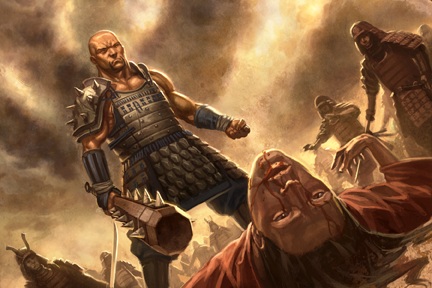 A character can make a maximum number of Raises per roll equal to his Void Ring. A character with Void 2, for instance, can make 1 or 2 Raises per roll, but not 3. Some mechanical effects grant a character Free Raises. These give the benefit of having made a Raise without actually increasing the TN of the roll in question, and do not count toward the maximum number of Raises that may be made per roll. Free Raises may also be used to reduce the TN of the task being attempted by 5 instead of augmenting the roll in the same way as a normal Raise.
A character can make a maximum number of Raises per roll equal to his Void Ring. A character with Void 2, for instance, can make 1 or 2 Raises per roll, but not 3. Some mechanical effects grant a character Free Raises. These give the benefit of having made a Raise without actually increasing the TN of the roll in question, and do not count toward the maximum number of Raises that may be made per roll. Free Raises may also be used to reduce the TN of the task being attempted by 5 instead of augmenting the roll in the same way as a normal Raise. Raises are not without risk, however. If a player declares Raises on a roll, and the result of his roll fails to meet the new, increased TN, the roll fails. This is a failure even if the result of the roll meets the original TN but falls short of the new, increased TN.
A player may declare he is spending a Void Point any time when it would be applicable, but the most common instances are before the player’s character makes a roll, takes certain types of Actions, or takes damage. The expenditure of a Void Point enhances a roll or the character’s abilities in one of a number of different ways. A character may normally only spend one Void Point per Round for one of the following effects, although some abilities may allow them to spend more than one under certain circumstances. By spending a Void Point, a character may:
* Gain a bonus of +1k1 to a Skill, Trait, Ring, or Spell Casting roll (the Void Point expenditure must be declared prior to the roll being made). Damage Rolls may not be enhanced in this manner.
* Temporarily increase his rank in a Skill from 0 to 1, avoiding Unskilled Roll penalties.
* Reduce the amount of Wounds suffered from one source of damage by 10 (this must be done immediately after the damage total is announced).
* Increase his Armor TN by 10 for one round. This is done at the beginning of the combat Round.
* Exchange his Initiative Score with one willing target for the remainder of the current skirmish. This is done at the beginning of the combat Round. Only one of the two characters needs to spend a Void for this effect to take place.
* Increase his Initiative Score by 10 for the duration of the current skirmish. This is done at the beginning of the combat Round.
Also, Void Points may be spent to activate certain School Techniques - this does not count against the once per Round restriction.
TN None - Difficulty: Mundane - Getting out of bed/Remembering details of your sword
TN 5 - Difficulty: Very Easy - Striking an immobile target/Recognizing an old friend
TN 10 - Difficulty: Easy - Carrying half your weight/ Finding a misplaced item
TN 15 - Difficulty: Average - Lifting your weight/Remembering someone you’ve seen once
TN 20 - Difficulty: Moderate - Jumping a tenfoot ditch/Recognizing someone in disguise
TN 25 - Difficulty: Difficult - Scaling a cliff without rope/Finding a wellhidden object
TN 30 - Difficulty: Very Hard - Diving safely from a waterfall/Remembering someone’s exact words
TN 40 - Difficulty: Heroic - Out-wrestling a troll/Naming all of your ancestors… in Order
TN 60 - Difficulty: Impossible - Shattering stone with bare hands/Outwitting a fortune
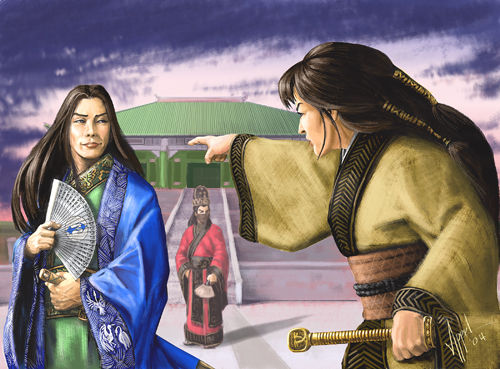 It is rare that a player will keep all of the dice rolled when his character is taking an action. Typically, a player can keep a smaller number of dice than the amount rolled, and in almost all situations the player will choose the highest rolling of the dice, although he may keep whichever ones he chooses; if for some reason he wishes for his character to fail the roll in question, he may choose lower rolling dice. When denoting the number of dice that should be rolled and kept, the format used is XkY, where X represents the number of dice rolled, or “rolled dice,” and Y the number of dice kept, or “kept dice.” For example, the notation 4k2 means that four dice should be rolled and two of them chosen to be kept and added together; if the player rolled a 3, 6, 7, and 9, the player would likely choose the 7 and 9 for a total of 16 on the roll.
It is rare that a player will keep all of the dice rolled when his character is taking an action. Typically, a player can keep a smaller number of dice than the amount rolled, and in almost all situations the player will choose the highest rolling of the dice, although he may keep whichever ones he chooses; if for some reason he wishes for his character to fail the roll in question, he may choose lower rolling dice. When denoting the number of dice that should be rolled and kept, the format used is XkY, where X represents the number of dice rolled, or “rolled dice,” and Y the number of dice kept, or “kept dice.” For example, the notation 4k2 means that four dice should be rolled and two of them chosen to be kept and added together; if the player rolled a 3, 6, 7, and 9, the player would likely choose the 7 and 9 for a total of 16 on the roll.
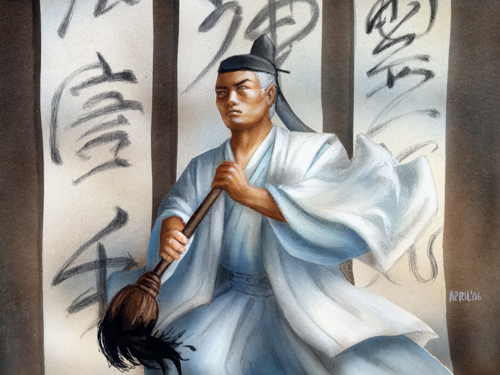 The continuing storyline also proved to be a bigger headache for players with each new edition of the RPG. The setting of First Edition describes the Emerald Empire two years before the Scorpion Clan Coup. Second Edition pushes the story forward to the Scorpion Clan Coup, altering details about the setting. While most players adjusted well to the change, those with Scorpion Clan samurai PCs had to figure out exactly how their character fit in when officially their entire Clan was banished. Third Edition changed the setting further by pushing it forward forty years! Players often deviated from the official timeline in their games, but they were forced to make minor adjustments to schools and paths to make the flavor mesh.
The continuing storyline also proved to be a bigger headache for players with each new edition of the RPG. The setting of First Edition describes the Emerald Empire two years before the Scorpion Clan Coup. Second Edition pushes the story forward to the Scorpion Clan Coup, altering details about the setting. While most players adjusted well to the change, those with Scorpion Clan samurai PCs had to figure out exactly how their character fit in when officially their entire Clan was banished. Third Edition changed the setting further by pushing it forward forty years! Players often deviated from the official timeline in their games, but they were forced to make minor adjustments to schools and paths to make the flavor mesh. So, after conferring with my friend, AEG’s Senior Brand Manager Todd Rowland, the decision was made that the new edition of the core rules would be beholden to no storyline, but emphasize the setting in its most iconic state. No more fluff talking about who is fighting whom at any given point in time, no more mechanics tied to specific incidents in the timeline… none of that. The core rules are now yours to do with as you see fit, New Player. If that should be playing in the official storyline, we’re happy to help you with that. If it’s making your own way, then we’re giving you all the rules you need to make sure you can do exactly that. And as for you, Not-As-New Player, I hope you’ll have everything you’ve always wanted from the RPG this time around.
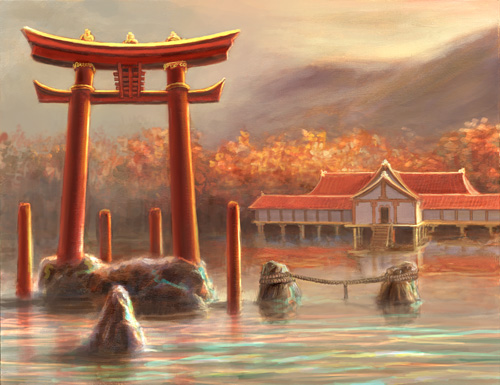 Rokugan is a fictional kingdom, a vast Empire whose history, myths, and culture draw heavily upon the real-life history and culture of ancient and medieval Asia, primarily Japan but also including China and Korea, among others. It is a land where samurai, honorable servants of the Divine Emperor, wage war and forge peace in the name of their lords. It is a land where mighty Great Clans, each comprised of multiple ancient families, work together and against one another in hopes of accomplishing their political and military agendas. It is a land where valiant warriors, or bushi, struggle to win the day for their clans on the fi eld of battle. It is a land where pious shugenja priests offer prayers to the multitude of Fortunes in hopes of achieving the blessings of Heaven for their lands. It is a land where courtier politicians wage an endless war of words, seeking any possible advantage for their clans. Rokugan is an Empire of honor and glory, of strife and adventure, of horror and mystery.
Rokugan is a fictional kingdom, a vast Empire whose history, myths, and culture draw heavily upon the real-life history and culture of ancient and medieval Asia, primarily Japan but also including China and Korea, among others. It is a land where samurai, honorable servants of the Divine Emperor, wage war and forge peace in the name of their lords. It is a land where mighty Great Clans, each comprised of multiple ancient families, work together and against one another in hopes of accomplishing their political and military agendas. It is a land where valiant warriors, or bushi, struggle to win the day for their clans on the fi eld of battle. It is a land where pious shugenja priests offer prayers to the multitude of Fortunes in hopes of achieving the blessings of Heaven for their lands. It is a land where courtier politicians wage an endless war of words, seeking any possible advantage for their clans. Rokugan is an Empire of honor and glory, of strife and adventure, of horror and mystery.
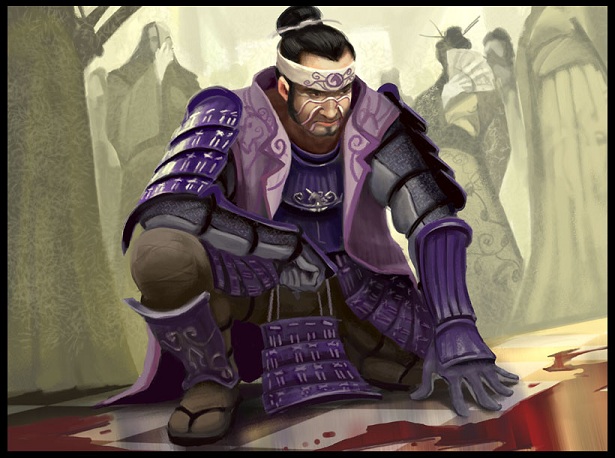 Be prepared for a setting unlike most you have played in before. As a samurai you are not expected to go off on a whim to fight wandering ogres and steal their vorpal blades. You are a servant warrior, beholden to the honor of your family and Clan. The land of Rokugan is rigid in its social and moral mores; the code of Bushido driving each beat of a samurai’s heart. Those around you will scrutinize every action you take, every word you say. While other games promote personal growth and success (and these things can be featured in L5R, to some extent), the primary driver is the achievement of glory for your Clan. As the old saying goes, to a samurai there is no greater honor than to serve the Emperor, and no greater glory than to die in his name. L5R is one of the few RPG’s where a good death is just as important as gaining a new level or spell.
Be prepared for a setting unlike most you have played in before. As a samurai you are not expected to go off on a whim to fight wandering ogres and steal their vorpal blades. You are a servant warrior, beholden to the honor of your family and Clan. The land of Rokugan is rigid in its social and moral mores; the code of Bushido driving each beat of a samurai’s heart. Those around you will scrutinize every action you take, every word you say. While other games promote personal growth and success (and these things can be featured in L5R, to some extent), the primary driver is the achievement of glory for your Clan. As the old saying goes, to a samurai there is no greater honor than to serve the Emperor, and no greater glory than to die in his name. L5R is one of the few RPG’s where a good death is just as important as gaining a new level or spell.
 Blood. Honor. Steel.
Blood. Honor. Steel.Welcome to the 4th Edition of the epic Role-Playing Game Legend of the Five Rings! Join us for the ultimate adventure of fantasy samurai, locked in perpetual battles of honor and glory within the bonds of the Code of Bushido.
The Emerald Empire of Rokugan demands much of its samurai: service to one’s lord, service to one’s Clan, and service to one’s Emperor. Bushido’s staunch and unyielding code of conduct binds samurai to duty, strengthening their character and defining their choices. While some samurai serve the greater good, others use the strictures of Bushido to manipulate the lower ranks and advance their own power. Will you follow honor or reject it? The choice is yours!
Eight Great Clans form the heart of Rokugan’s culture. Each is defined by its own principles, values, and agendas. Each sees the Code of Bushido in its own way. Each seeks to serve the Emperor with its own unique talents. Take up the soul of your ancestors — the samurai’s daisho — and fight for the glory and honor of your family and Clan. Now is the time for heroes, in a world where Honor is a force more powerful than Steel.
The Fourth Edition of L5R is the ultimate edition of the award-winning role-playing game. Inside this tome you will find:
A game unlike any you’ve played elsewhere. Honor and service are valued more than magic swords taken from wandering ogres. Prepare for the glorious life of the samurai!
A unique, comprehensive character sheet. Legend of the Five Rings rules have never been more easy to learn and to play. No more need to flip through pages of rules while fighting your enemies!
A toolbox approach to role-playing in Rokugan. Fourth Edition encourages gamemasters of Legend of the Five Rings to customize their game, adding or removing from their campaigns as they see fit.
A broad history of the Emerald Empire and the beliefs of all the Great Clans, with play options not only the major clans but also for outlying groups such as Imperials, Minor Clans, and the infamous Spider Clan.
DRAW YOUR BLADE AND JOIN THE FIGHT FOR ROKUGAN.
400 pages, hardbound
